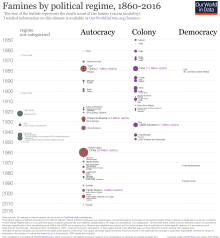The conventional explanation until 1951 for the cause of famines was the decline of food availability relative to the nutritional needs of the population (abbreviated as FAD for food availability decline). The assumption was that the central cause of all famines was a decline in food availability by reason of decline in food production or disruption of food distribution. However this does not explain why only a certain section of the population such as the agricultural laborer was affected by famines while others were insulated from them. On the other hand, inequalities in wealth or ability to exit food shortage areas sufficiently explain such phenomena.
Failure of exchange entitlements

It has been suggested by Amartya Sen in his book Poverty and Famines: An Essay on Entitlement and Deprivation that the causal mechanism for precipitating starvation includes many variables other than just the decline of food availability such as the inability of an agricultural laborer to exchange his primary entitlement, i.e. labor for rice, when his employment became erratic or was completely eliminated. According to the proposed theory, famines are due to an inability of a person to exchange his entitlements rather than to food unavailability. This theory is called the failure of exchange entitlements or FEE in short.
Amartya Sen also touches on this in an article titled The Food Problem: Theory and Policy from Third World Quarterly, "The approach of entitlements also provides guidance regarding relief of famines should it occur or threaten to occur. Moving food into famine areas will not in itself do much to cure starvation, since what needs to be created is food entitlement and not just food availability."
Lack of democracy

Amartya Sen advances the theory that lack of democracy and famines are interrelated; he cites the example of the Bengal famine of 1943, stating that it only occurred because of the lack of democracy in India under British rule. Sen further argues that the situation was aggravated by the British government's suspension of trade in rice and grains among various Indian provinces.
Olivier Rubin's review of the evidence disagrees with Sen; after examining the cases of post-Independence India, Niger, and Malawi, he finds that "democracy is no panacea against famine." Rubin's analysis questions whether democracy and a free press were sufficient to truly avert famine in 1967 and 1972 (the Maharashtra famine involved some 130,000 deaths), and notes that some dynamics of electoral democracy complicate rather than bring about famine relief efforts. Rubin does not address colonial period famines.
On the other hand, Andrew Banik's study Starvation and India's democracy affirms Sen's thesis, but indicates that while democracy has been able to prevent famines in India, it has not been sufficient to avoid severe under-nutrition and starvation deaths, which Banik calls a 'silent emergency' in the country.
According to a FEWSNET report, "Famines are not natural phenomena, they are catastrophic political failures."
See also
- Food security
- Great Famine (Ireland)
- Welfare economics
- Agricultural economics
- Nutritional anthropology
- r/K selection theory
- Socialism and famine
- Malthusian catastrophe
References
- Encyclopædia Britannica 2010. sfn error: no target: CITEREFEncyclopædia_Britannica2010 (help)
- ^ Chaudhari 1984, p. 135.
- Sen, Amartya (July 1982). "The food problem: Theory and policy". Third World Quarterly. 4 (3): 447–459. doi:10.1080/01436598208419641. ISSN 0143-6597.
- Sen, Amartya (1982). Poverty and Famines: An Essay on Entitlement and Deprivation. Oxford, New York: Oxford University Press. ISBN 9780198284635.
- Rubin 2009.
- Banik 2007.
- "FEWSNET report: 260,000 people died in the Somalia famine | Oxfam International". Oxfam.org. 2013-05-01. Retrieved 2020-04-04.
Sources
- Banik, Dan (2007). Starvation and India's democracy. Routledge. ISBN 978-0-415-40729-8.
- Chaudhari, B. B (1984). Desai, Meghnad; Rudolph, Susanne Hoeber; Rudra, Ashok (eds.). Agrarian Power and Agricultural Productivity in South Asia. Vol. 1. Berkeley: University of California Press. ISBN 978-0-520-05369-4. Retrieved 1 October 2010.
- Desai, Meghnad; Rudolph, Susanne Hoeber; Rudra, Ashok, eds. (1984). Agrarian power and agricultural productivity in South Asia. Vol. 1. University of California Press. ISBN 978-0-520-05369-4. Retrieved October 1, 2010.
- "Food-availability decline". Encyclopædia Britannica Online. 2010. Retrieved October 1, 2010.
- Rubin, Olivier (December 2009). "The Merits of Democracy in Famine Protection – Fact or Fallacy?". The European Journal of Development Research. 21 (5): 699–717. doi:10.1057/ejdr.2009.37. ISSN 0957-8811. S2CID 144820469.
| Population | |
|---|---|
| Major topics | |
| Population biology | |
| Population ecology | |
| Society and population | |
| Publications | |
| Lists | |
| Events and organizations |
|
| Related topics | |